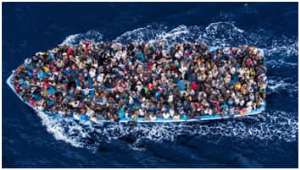
The National Development Planning Commission (NDPC) has held the first national consultation on the Global Compact for Safe, Orderly and Regular Migration (GCM).
The virtual sub-Cross-Sectoral Planning Group (CSPG) meeting held in collaboration with the Ministry of the Interior and the Ministry of Foreign Affairs and Regional Integration, with support from the International Organization for Migration (IOM) served as the first in preparation for the submission of Ghana's voluntary national review of GCM implementation.
It also aimed to determine Ghana's priorities for the next Medium-Term National Development Policy Framework (MTNDPF) from 2022-2025, and to discuss Ghana's commitments on migration within the International Conference on Population and Development (ICPD+25) Programme of Action.
Director-General of NDPC, Dr. Kodjo Esseim Mensah Abrampah, in a statement delivered on his behalf said Ghana has signed unto the GCM, and committed to prepare and submit its voluntary national review.
He added that the NDPC is integrating Ghana's regional, continental and international commitments such as the Sustainable Development Goals (SDGs), Beijing Platform for Action, ICPD+25 and the GCM, among others, into the country's national development policy frameworks and is coordinating their implementation, monitoring and evaluation in tandem with the various reporting mechanisms.
The GCM was adopted by the United Nations (UN) General Assembly in 2018 and is the first comprehensive global framework to enhance international cooperation on migration governance. Its 23 objectives cover migration management in a holistic and comprehensive manner.
In the recently published UN Secretary-General (SG) Report “From Promise to Action: The Global Compact for Safe, Orderly and Regular Migration”, the SG emphasizes that the GCM is a testament to our growing understanding of the power of migration: inevitable, undeniably beneficial but capable of generating challenges to migrants and communities if not well-governed. The GCM is aligned to regional migration agendas, including the Economic Community of West African States' (ECOWAS) Free Movement Protocols and the African Union Migration Policy Framework. It is also complementary to the 2030 Agenda for Sustainable Development.
“The 2030 Agenda includes a pledge to 'leave no one behind', and to endeavour to reach the furthest behind first. Many SDG targets can only be fully achieved if migration and migrants are considered. Enhancing migration governance through the implementation of the GCM will be essential, and thus we look forward to continuing our partnership in this effort,” said Charles Abani, UN Resident Coordinator in Ghana.
To support the implementation, follow-up and review of the GCM, the UN Resident Coordinator and IOM established the UN Network on Migration (UNNM) in Ghana to facilitate effective, timely and coordinated UN-system-wide support. To increase advocacy and ownership on the GCM, 18 countries have volunteered to be champion countries, including Ghana.
“IOM and the UNNM are committed to continually support the Government of Ghana in the GCM process as it seeks to harness the development potential inherent in migration.
During these trying times, the GCM provides an effective framework for the governance of international migration in all its dimensions, which can be leveraged by states to respond to the Covid-19 crisis,” said Abibatou Wane-Fall, IOM Ghana Chief of Mission.
---Daily Guide




 "I can now see clearly with my two eyes, thanks to the generosity of Afenyo-Mark...
"I can now see clearly with my two eyes, thanks to the generosity of Afenyo-Mark...
 Election 2024: Power outages will affect NPP – Political scientist
Election 2024: Power outages will affect NPP – Political scientist
 NPP is 'a laughing stock' for luring 'poster-stickers', 'noisemaking babies' wit...
NPP is 'a laughing stock' for luring 'poster-stickers', 'noisemaking babies' wit...
 Dumsor: Matthew Opoku Prempeh must be removed over power crisis – IES
Dumsor: Matthew Opoku Prempeh must be removed over power crisis – IES
 PAC orders WA East DCE to process requests from their MP
PAC orders WA East DCE to process requests from their MP
 Defectors who ditched Alan’s Movement to rejoin NPP were financially induced – A...
Defectors who ditched Alan’s Movement to rejoin NPP were financially induced – A...
 Dumsor: Akufo-Addo has taken Ghanaians for granted, let’s organise a vigil – Yvo...
Dumsor: Akufo-Addo has taken Ghanaians for granted, let’s organise a vigil – Yvo...
 April 23: Cedi sells at GHS13.66 to $1, GHS13.07 on BoG interbank
April 23: Cedi sells at GHS13.66 to $1, GHS13.07 on BoG interbank
 GRA clarifies tax status of resident individuals earning income abroad
GRA clarifies tax status of resident individuals earning income abroad
 2024 elections: NDC to officially unveil Jane Opoku-Agyemang as running mate tom...
2024 elections: NDC to officially unveil Jane Opoku-Agyemang as running mate tom...
